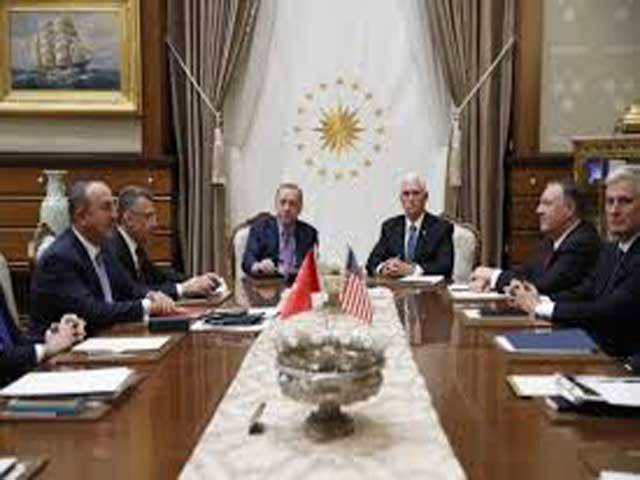ANKARA - Turkish President Recep Tayyip Erdogan put US President Donald Trump’s letter “in the bin”, the BBC has been told. In the letter dated 9 October, and sent after US troops were pulled out of Syria, Mr Trump told Erdogan: “Don’t be a tough guy. Don’t be a fool!”
President Trump was urging Turkey not to launch a military offensive against Kurdish-led forces in northern Syria, but Erdogan ignored this request.
US Vice President Mike Pence is now in Ankara to push for a ceasefire. The US has faced intense criticism for the withdrawal of troops, which critics say gave Turkey the green light to launch the military attack.
In recent years, the Kurdish-led Syrian Democratic Forces (SDF) alliance has been a critical ally to the US in the fight against the Islamic State (IS) group in Syria. There are fears that the destabilisation of northern Syria could lead to a jihadist resurgence. The SDF is dominated by the members of a Kurdish militia called the People’s Protection Units (YPG).
Turkey says the YPG is an extension of the Kurdistan Workers’ Party (PKK), a rebel group fighting for Kurdish autonomy in the region.
In his letter to President Erdogan, Trump wrote: “Let’s work out a good deal! You don’t want to be responsible for slaughtering thousands of people, and I don’t want to be responsible for destroying the Turkish economy - and I will.
“History will look upon you favourably if you get this done the right and humane way. It will look upon you forever as the devil if good things don’t happen.” In response, Turkish presidential sources told BBC Turkish: “President Erdogan received the letter, thoroughly rejected it and put it in the bin.”
It is hard to imagine language like it in many letters between presidents. Donald Trump’s mixture of threats and locker-room banter infuriated Turkey’s President Recep Tayyip Erdogan. His staff told the BBC that he threw the letter into the bin and launched the Syrian operation the same day. That could be proof there was no Trumpian green light.
But ever since President Obama partnered up with the Syrian Kurds of the Syrian Democratic Forces (SDF) against the jihadists of IS it was clear the arrangement would lead to problems with the Turks. That’s because the SDF is very close to the Turkish Kurds of the PKK. Turkey says they are two halves of the same terror group.
US Vice President Mike Pence met President Tayyip Erdogan on Thursday on a mission to persuade him to halt an offensive against Kurdish fighters in northeast Syria, but Turkish officials said the action would continue regardless.
A Turkish official told Reuters: “The letter Trump sent did not have the impact he expected in Turkey because it had nothing to take seriously. What is clear is that Turkey does not want a terrorist organisation on its border and the operation will not stop because of the reaction that has been coming.”
Pence and Secretary of State Mike Pompeo did not speak to reporters before the start of the meeting with Erdogan, but the official said they were likely to convey the same US demands, adding: “However, negotiating with a terrorist organisation or turning back from the ongoing operation are not on the agenda.”
Erdogan has dismissed the sanctions and rejected a global chorus of calls to halt the offensive, which Turkey says will create a “safe zone” extending 20 miles (32 km) into northeast Syria to ensure the return of millions of Syrian refugees and clear the area of Kurdish militia Ankara views as terrorists.
Turkey will end its operation when Kurdish forces withdraw from the “safe zone” and “no power” can deter the operation until it reaches its goals, the Turkish leader said. Earlier in the day, Russia’s foreign ministry spokeswoman said Syria should get control over its border with Turkey as part of any settlement of the conflict in the region. Assad vowed that Syria would respond to the Turkish offensive on any part of its territory with “all legitimate means” available, Syrian state media said on Thursday.
Ankara views the US-backed YPG as a terrorist organisation because of its link to Kurdish militants waging an insurgency inside Turkey, and had been infuriated by Washington’s support. A Reuters cameraman along the Turkish border with Syria said clashes continued around the border town of Ras al Ain on Thursday and that Turkish warplanes were flying overhead after a lull in fighting overnight.
Ankara had previously said it has taken control of Ras al Ain and Tel Abyad, two key towns along the frontier. The region’s Kurdish-led authority called for a corridor “to evacuate dead and wounded civilians” from Ras al-Ain. It said people were trapped in the town, urging foreign powers including the US-led coalition and Russia, to intervene to get them out.
Syrian troops accompanied by Russian forces have meanwhile entered Kobani, a strategic border city and potential flashpoint for a wider conflict, said the British-based monitor the Syrian Observatory for Human Rights. Lebanon’s al-Mayadeen TV reported that Russian-backed Syrian forces had also set up outposts in Raqqa, the one-time capital of Islamic State’s caliphate, which the Kurds captured in 2017 at the peak of their campaign with US support.
Hezbollah’s al-Manar TV said from the Tabqa military air base near Raqqa that Syrian government troops had advanced in that area. “We entered the Tabqa military airport easily, there was no difficulty,” an army officer told the channel from the base, where Islamic State fighters executed scores of Syrian troops and circulated a video of their corpses in 2014.
Soldiers entered Tabqa and nearby villages on Monday, state media said, a deployment that restored the state’s foothold in that part of Syria for the first time in years. With US air power and special forces, the SDF had battled for weeks in 2017 to take Tabqa and a nearby hydroelectric dam - the country’s largest dam - from Islamic State.






